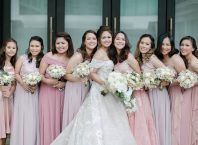In our culture, elders play significant roles in marriages or weddings. From the choice of venue and date to the list of sponsors, the opinions of elders are almost always given due importance. In some cultures, even the choice of partners lie on the choices of the elders. While the practice has is frowned at in some cultures, it has become so deeply etched in our customs that acceptance out of respect for tradition becomes commonplace.
For the Manobos, for instance, the elders in the groom’s family decide whether a bride is acceptable. A proposal is then sent to the paternal uncle for the marriage. The bride-to-be’s family then asks for the bride wealth, which could be paid with money, land, animals, or precious stones. If an agreement is reached, the wedding ceremony is formally started.
The groom’s datu or spokesperson offers a kagun composed of a plate, a threaded needle, string of beads and a peso coin, to the bride’s datu. He also offers a delundun or any property of value. It is here that the two datus set a date for the wedding.
After the date has been set, the bride’s family must send a chicken to the groom, the blood of the chicken will be used in anointing the groom and his relatives to prevent misfortune and to assist them in gathering the required bride wealth. For their part, the bride’s family prepares the apa, or food for the wedding feast. The apa is only fed to the prospective in-laws.
On the day of the wedding, the groom’s party goes to the bride’s house. The groom’s datu meets with his counterpart to announce their arrival. The latter will hen announce the arrival and signal the groom’s party to enter the house. But before entering, they must grant or bargain with the ed-ipal’s wishes. An ed-ipal could be anyone from the bride’s family. During this time, the bride is made to hide behind a curtain with someone watching her so she can’t come out.
The groom and his companions are then fed. The parents and datus of the couple can only eat after the ceremonial exchange of food or seru. The bride’s party are fed next, entirely from a different menu.
The two datus must now negotiate for the bride wealth. The bride’s datu lays out rirey of the value placed on the bride. Then he also sets out the ibatu, or what the bride’s father had paid to her mother. Then he asks the groom’s family for the bata, one or five centavo coins given to the elders, and also to the spirits. Then he asks for the lihilihi, porcelain plates given to the girl to prevent omen. The boy’s family will also be asked for the purangan (value of endless nights the bride’s parents endured rearing their daughter), tugenan (value of the nourishment they provide to their daughter) and the pemuka (sum of eight pesos).
The rirey or bride’s value will be always not paid in full even if the groom can afford it. This is because the groom is expected to serve the bride and her family whenever they need help. In the event that she is maltreated by her husband, the wife can likewise demand for the amount left unpaid.
After the bride’s wealth has been negotiated, it is time for the groom’s family to give the tenges or headcloth to the bride’s family. This is followed by the seru, a ritual exchange of food among immediate family members and the two datus. The two datus form rice balls that will be given to the couple to eat. The bride’s mother then prepare a betel chew which she hands down to her daughter who gives it to her husband. Towards the end of the ceremony, the couple will be led the sleeping area where they will be advised by their elders.
Except for the parents, the groom’s party may go back to their home after the wedding rites. The parents of the groom are expected to wait for three days, during which they offer sacrifices to purify the newlyweds. This is done to avoid offending the souls of the couple.
After the offering has been made, the groom’s parent leave for their home. The groom follows ‘to call his soul back’. Here, he is purified with blood whenever he arrives in his old home. He must also bring back one article of clothing for every day he spent in his old home. This marks the culmination of a Manobo wedding.
. . . . . . . . . . . . . . . . . . . . . . . . . . . . . . . . . . . . . . . . . . . . . . . . . . . . . . . . . . . . . . . . . . . . . . .
Reference:
Polenda, Francisco Col-om. A Voice From the Hills: Essays on the Culture and World View of the Western Bukidnon Manobo People. Manila: Linguistic Society of the Philippines, 2002.




